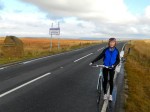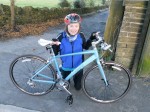Kate’s pedal power to help Beat the stigma
Kate’s pedal power to help Beat the stigma
Recovery from an eating disorder requires the sufferer, in many ways, to become their own chief therapist. Recovery involves learning skills that enables the rebuilding of a true sense of self and re-engaging in life, while defusing, deflecting and eliminating the illness thoughts. Learning to recognise and delete the bully thoughts, and replace them with true thoughts and behaviors, requires hard and constant work. But don’t be deterred – it can be done – at every age – and the rewards are great! Getting involved in advocacy is something that I, and many others, find a great way to maintain our health, say ‘thank you’ to those who have helped us, give encouragement to others, and increase awareness of eating disorders as a serious mental health and medical condition.
Kate Barton aims to help stamp out ‘Ed’ by pedaling the message through three countries.
Let’s hear from Kate:
My name is Kate Barton and after suffering from anorexia for 14 years, during which time I have had two
lengthy stays in hospital, I can finally say I am in recovery and growing nearer that finish line every day! It is very exciting, very liberating and life is so much fun – as cheesy as it all sounds. Anyway, as a result, I am passionate about helping others, raising awareness and funds for Beat. I have witnessed first hand the devastating effect this illness has not only on sufferers themselves but also on the families and friends of those close to the sufferer.
 Beat has helped me in my recovery and I would now like to give something back so I am cycling 338 miles from London, to Brussels and through Amsterdam in August, in four days. I am hoping to raise £1500 (approximately AU $2250, or US $2333) and have been doing lots of fundraising in a bid to manage this!
Beat has helped me in my recovery and I would now like to give something back so I am cycling 338 miles from London, to Brussels and through Amsterdam in August, in four days. I am hoping to raise £1500 (approximately AU $2250, or US $2333) and have been doing lots of fundraising in a bid to manage this!
Therefore, I wondered, would you be able to help by giving the challenge a mention online! If my pedal power can do one thing, it would be to change the stigma attached to mental health and provide hope for others, showing that recovery is possible. I’m determined to turn a very negative time into something positive.
About Kate:
What part of the UK do you live?
I live in West Yorkshire, in a little village called Lightcliffe, when I’m not at university anyway! Yorkshire provides lots of interesting training routes over the Pennines. I’m a third year English Language student at Bangor University – graduation is just round the corner. I currently work at Asda, alongside my studies, which is great for bringing in those much needed pennies.
What inspired you to ride a bike as a way of fund-raising?
My Dad has been an avid cyclist for as long as I can remember. This hobby brings him so much joy and pleasure, that I couldn’t resist joining in when I was up to it physically. I gradually increased the number of miles completed on routes and quickly got taken over by the cycling bug! There is something fantastic about the freedom of the open road, just you and two wheels. The huge sense of achievement as you scale the hills and then whizzing back down the other side! Cycling acts to show me that anything is possible if you put your mind to it – no hill is ‘unclimbable’!
What do you enjoy most about the freedom that is your reward for doing the hard work of recovery?
Being able to walk outside, feel the wind blowing in my hair and be thankful that I’m alive. Knowing I can enjoy life without being governed by the eating disorder makes every day that much more enjoyable. I can laugh both inside and outside, and that feels fantastic. I also enjoy the refreshing honesty that life now brings, no more lies and secrets.
Why do you think it is important to raise awareness of eating disorders?
Eating Disorders are silent illnesses, in many respects. I believe that it is this silence that is an eating disorders most lethal weapon. An eating disorder wants to steal the sufferer from the world, and through remaining silent this is easier for it to achieve. By raising awareness we can weaken the power of these illnesses, show those effected they can get help and can recovery. And, I more importantly, help them to see they deserve both. I think it is essential to challenge the stigma and stereotypes often associated with eating disorders, and mental health. Mental health illnesses are just as serious as physical illnesses – indeed mental illnesses can often have effects physically too.
Would more awareness have been helpful for you and your family in the early stages of your anorexia?
My anorexia developed in the late 1990s and a lot has changed since then in terms of care, I do think things are gradually improving. However, at that time, it was not as well documented that eating disorders existed. To a family who did not know of anorexia, it never crossed our minds we were dealing with anorexia. I was all engulfed by the disease, and my family thought there must have been something else medically wrong. I think more awareness of the signs and symptoms would have alerted us to the real problem sooner, and maybe have prevented the years of torment.
What have you found most helpful during recovery?
The thing that always sticks with me that has pushed me on in my recovery, and continues to do so, are the words of a fellow patient. She simply said: “you’ve got to fight your way out of this because you never know how much it can take from you”. It really struck a chord with me and I will never forget those words. The support of friends and family has been monumental in my recovery, helping me to know that they love me for simply being me. I’ve taken a lot of CBT skills with me from my hospital admissions, knowing how to challenge my core beliefs which in many respects got me into the thick of anorexia. A nurse once said to me to use the determination I used to listen to anorexia to do the opposite, to fight anorexia. It is so true as being able to go against what your body is telling you for so long takes a lot of strength. “Love yourself first and everything else falls into line”.
Message for those developing an eating disorder, or a friend who may be developing an eating disorder.
My advice would be to talk, talk and talk some more. Having an eating disorder doesn’t mean you are pathetic, weak, stupid or vein. It isn’t your fault. Tell somebody, anybody and break the silence. Once you admit you’ve got a problem, it is only then you can work towards tackling it. I would also say don’t give up hope as you try to walk ‘recovery road’ – there will be bad days, but there will be good days too. To those who think they know somebody who may be suffering, I reiterate the need to talk, to approach the issue sensitively and to work together as a team to tackle the problem. The earlier an eating disorder is stopped, the easier it is to recover.
Support Kate’s Three City Cycle Ride August 2013
To encourage and help Kate meet – and better still, beat – her fund raising target, go to:
www.doitforcharity.com/katebarton
I look forward to following Kate’s ride and am sure you do, too.
We are pulling for you, Kate, and look forward to an update:-)









